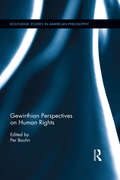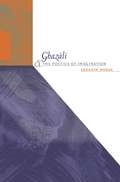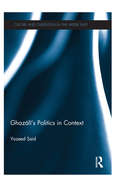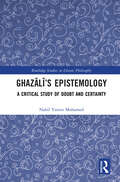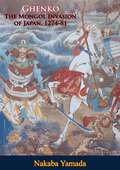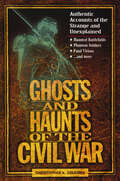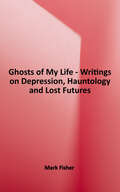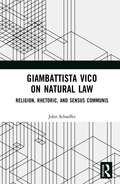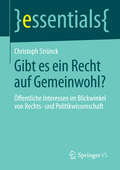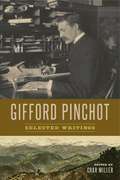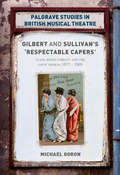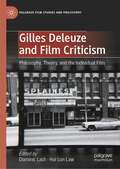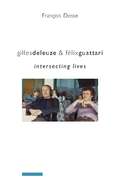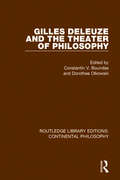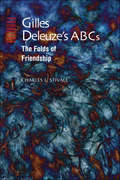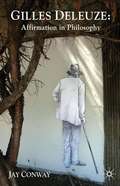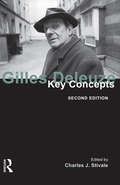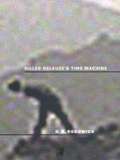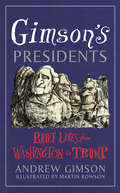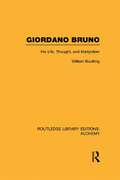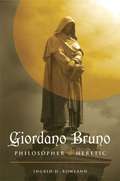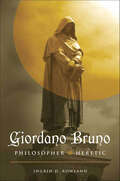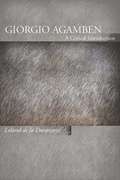- Table View
- List View
Gewirthian Perspectives on Human Rights (Routledge Studies in American Philosophy)
by Per BauhnGewirth’s theory of human rights has made a major contribution to philosophy. In this edited collection, contributors from a broad range of disciplines discuss the theoretical and practical application of Gewirthian theory to current world issues. Case studies highlight mental health, the LGBT community, intellectual disabilities, global economic inequality, and market instability to provide a truly interdisciplinary study. This important contribution to human rights scholarship provides a platform for further discussion of Gewirthian theory. It will be of interest to those researching moral, legal, and political philosophy, as well as policy makers, social workers, and medical staff.
Ghatsutra: घातसूत्र
by Deepak Karanjikar'घातसूत्र' ही कादंबरी नाही. इतिहास नाही. अर्थशास्त्रीय - राजकीय ग्रंथ नाही. प्रबंध नाही. आंतरराष्ट्रीय घडामोडींचे संकलन नाही. तत्वज्ञान नाही. आध्यात्मिक प्रवचन नाही. वा क्लिष्ट नाही चिंतनाचे तथाकथित निरूपण नाही. दीपक करंजीकर यांनी या सर्वांच्या पलीकडे नेणारा, म्हटले तर चित्तथरारक, सर्वंकष आणि त्याचवेळेस व्यासंगी उद्बोधन - प्रबोधन करणारा, पण एक उत्कंठापूर्ण, अर्वाचीन इतिहासाने सजलेला, समकालीन जागतिक शोधग्रंथ लिहिला आहे. सध्याच्या विलक्षण गुंतागुंतीच्या, आर्थिक अरिष्टाच्या, संभाव्य प्रलयसमान भासणाऱ्या आंतरराष्ट्रीय प्रवाहांचा घेतलेला हा वेधक शोध आहे. अगदी सुरुवातीपासून शेवटपर्यंत वाचकांचे मन खिळवून ठेवतानाच, त्याला प्रस्थापित जगाचे भान यावे म्हणून दिशादर्शन करणारे हे लेखन कोणत्याही विशिष्ट ग्रंथशाखेत मोडत नसले तरी त्यात इतिहास, भूगोल, अर्थकारण, राजकारण, समाजकारण, तत्वज्ञान हे सर्व रहस्यमयतेने येते. वैचारिक आत्मविश्वासही देते!
Ghazali and the Poetics of Imagination
by Ebrahim MoosaAbu Hamid al-Ghazali, a Muslim jurist-theologian and polymath who lived from the mid-eleventh to the early twelfth century in present-day Iran, is a figure equivalent in stature to Maimonides in Judaism and Thomas Aquinas in Christianity. He is best known for his work in philosophy, ethics, law, and mysticism. In an engaged re-reading of the ideas of this preeminent Muslim thinker, Ebrahim Moosa argues that Ghazali's work has lasting relevance today as a model for a critical encounter with the Muslim intellectual tradition in a modern and postmodern context. Moosa employs the theme of the threshold, or dihliz, the space from which Ghazali himself engaged the different currents of thought in his day, and proposes that contemporary Muslims who wish to place their own traditions in conversation with modern traditions consider the same vantage point. Moosa argues that by incorporating elements of Islamic theology, neoplatonic mysticism, and Aristotelian philosophy, Ghazali's work epitomizes the idea that the answers to life's complex realities do not reside in a single culture or intellectual tradition. Ghazali's emphasis on poiesis--creativity, imagination, and freedom of thought--provides a sorely needed model for a cosmopolitan intellectual renewal among Muslims, Moosa argues. Such a creative and critical inheritance, he concludes, ought to be heeded by those who seek to cultivate Muslim intellectual traditions in today's tumultuous world.
Ghazali's Politics in Context (Culture and Civilization in the Middle East)
by Yazeed SaidImam Abü Hamid al-Ghazalı is perhaps the most celebrated Muslim theologian of medieval Islam yet little attention has been paid to his personal theology. This book sets out to investigate the relationship between law and politics in the writings of Ghazalı and aims to establish the extent to which this relationship explains Ghazalı’s political theology. Articles concerned with Ghazalı’s political thought have invariably paid little attention to his theology and his thinking about God, neglecting to ask what role these have contributed to his definition of politics and political ethics. Here, the question of Ghazalı’s politics takes into account his thinking on God, knowledge, law, and the Koran, in addition to political systems and ethics. Yazeed Said puts forward the convincing argument that if Ghazalı’s legal and political epistemology provide a polemic analogous to his writings on philosophy, for which he is more famed, they would reveal to us a manifesto for an alternative order, concerned with a coherent definition of the community, or Ummah. This book will be an invaluable resource for students and scholars of the Middle East, political theology and Islamic studies.
Ghazālī’s Epistemology: A Critical Study of Doubt and Certainty (Routledge Studies in Islamic Philosophy)
by Nabil Yasien MohamedFocusing on Abū Ḥāmid al-Ghazālī (d. 1111) – one of the foremost scholars and authorities in the Muslim world who is central to the Islamic intellectual tradition – this book embarks on a study of doubt (shakk) and certainty (yaqīn) in his epistemology. The book looks at Ghazālī’s attitude to philosophical demonstration and Sufism as a means to certainty. In early scholarship surrounding Ghazālī, he has often been blamed as the one who single-handedly offered the death-blow to philosophy in the Muslim world. In much of contemporary scholarship, Ghazālī is understood to prefer philosophy as the ultimate means to certainty, granting Sufism a secondary status. Hence, much of previous scholarship has either focused on Ghazālī as a Sufi or as a philosopher; this book takes a parallel approach, and acknowledges each discipline in its right place. It analyses Ghazālī’s approach to acquiring certainty, his methodological scepticism, his foundationalism, his attitude to authoritative instruction (taʿlim), and the place of philosophical demonstration and Sufism in his epistemology. Offering a systematic and comprehensive approach to Ghazālī’s epistemology, this book is a valuable resource for scholars of Islamic philosophy and Sufism in particular, and for educated readers of Islamic studies in general.
Ghenko: The Mongol Invasion of Japan, 1274-81
by Nakaba Yamada“A ferocious conflict between Mongol and Samurai.The Japanese word 'Ghenko' is the term employed for the Mongol invasion of Japan. The event was an immensely significant one for the Japanese and it remained so for centuries because, in part, the defeat of the invaders was attributed to divine intervention. There can be little doubt that Japan's salvation had much to do with the fact that they are an island race and in that they have much in common with other islanders, Great Britain among them, who on more than one occasion might claim the sea as their principal and most powerful ally. Indeed, the author of this book draws parallels with Britain and the Spanish Armada. The Mongols had rapidly risen to power during the 13th century and had created an unstoppable empire that spread over huge areas of land from the Yellow Sea of Asia to the Danube in Europe. Although massively stronger than the Japanese, the Mongols attacked the Japanese islands, attempting domination by invasion and yet were repulsed with finality. To modern students of military history the contents of this book has a compelling allure, since there can be no doubt that in the Mongol warrior and the Japanese Samurai there resided a martial spirit and expertise which, perhaps inevitably, could not both exist in the same sphere, but which in collision could not fail to instigate conflict of the most singular kind. This account of the clash between the ultimate warriors of their day analyses this time of warfare in superb detail. An essential addition to the library of anyone interested in the warfare of the East.”-Print ed.
Ghosts and Haunts of the Civil War: Authentic Accounts of the Strange and Unexplained
by Christopher K. ColemanExplore the strange and shadowy side of the civil war . . . A fascinating collection of ghostly sightings, auspicious visions, audible manifestations, and uncanny premonitions.In 1872 a photographer who claimed he could capture the "essence' of dead relatives took an image purporting to show Mary Todd Lincoln with the protective ghost of Abraham Lincoln behind her.The spirit of George Washington who appeared to John C. Calhoun in the 1840s to persuade him not to dissolve the union.The nameless drummer boy from the Army of Ohio who still plays at the Shiloh battlefieldThe twentieth-century schoolchildren who heard the Irish brigade on the Antietam battlefieldTeddy Roosevelt and First Lady Grace Coolidge who both claim to have enountered Abraham Linicoln in the White HouseJefferson davis and his wife Varina who both have been seen at Fort Monroe, Virginia, where he was imprisoned after the War
Ghosts of My Life: Writings on Depression, Hauntology and Lost Futures
by Mark FisherThis collection of writings by Mark Fisher, author of the acclaimed Capitalist Realism, argues that we are haunted by futures that failed to happen. Fisher searches for the traces of these lost futures in the work of David Peace, John Le Carre, Christopher Nolan, Joy Division, Burial, and many others.
Giambattista Vico on Natural Law: Rhetoric, Religion and Sensus Communis
by John SchaefferThis book introduces the thought of Giambattista Vico (1668-1744) into the discussion about natural law. For many critics, natural law is not natural but a façade behind which lurks the supernatural – that is, revealed religion. While current notions of natural law are based on either Aristotelian/Thomistic principles or on Enlightenment rationalism, the book shows how Vico was the only natural law thinker to draw on the Roman legal tradition, rather than on Greek or Enlightenment philosophy. Specifically, the book addresses how Vico, drawing his inspiration from Roman history, incorporated both rhetoric and religion into a dynamic concept of natural law grounded in what he called the sensus communis: the entire repertoire of values, images, institutions, and even prejudices that a community takes for granted. Vico denied that natural law could ever furnish a definitive answer to moral problems in the social/public sphere. Rather he maintained that such problems had to be debated in the wider arena of the sensus communis. For Vico, as this book argues, natural law principles emerged from these debates; they did not resolve them.
Gibt es ein Recht auf Gemeinwohl?: Öffentliche Interessen im Blickwinkel von Rechts- und Politikwissenschaft (essentials)
by Christoph StrünckPolitikwissenschaftliche Pluralismustheorien betrachten Gemeinwohl als Resultat politischer Kompromisse. Solche prozeduralen Konzepte finden sich auch in der Rechtswissenschaft, wenn es darum geht, allgemeinen und schwachen Interessengruppen besondere Klagerechte einzuräumen. Allerdings müssen Gerichte in ihren Urteilen inhaltlich begründen, inwiefern mit solchen Klagen öffentliche Interessen gewahrt werden. Am Beispiel des Verbraucherschutzes erläutert der Autor, warum moderne Pluralismuskonzepte auch solche inhaltlichen Gemeinwohlbestimmungen in die Analyse der Interessenvermittlung einbeziehen sollten.
Gifford Pinchot: Selected Writings (Pioneers Of Conservation Ser.)
by Char Miller Gifford PinchotThe founding chief of the U.S. Forest Service and twice governor of Pennsylvania, Gifford Pinchot was central to the early twentieth-century conservation movement in the United States and the political history and evolution of the Keystone State. This collection of Pinchot’s essays, articles, and letters reveals a gifted public figure whose work and thoughts on the environment, politics, society, and science remain startlingly relevant today. A learned man and admirably accessible writer, Pinchot showed keen insight on issues as wide-ranging as the rights of women and minorities, war, education, Prohibition, agricultural policy, land use, and the craft of politics. He developed galvanizing arguments against the unregulated exploitation of natural resources, made a clear case for thinking globally but acting locally, railed at the pernicious impact of corporate power on democratic life, and firmly believed that governments were obligated to enhance public health, increase economic opportunity, and sustain the land. Pinchot’s policy accomplishments—including the first clean-water legislation in Pennsylvania and the nation—speak to his effectiveness as a communicator and a politician. His observations on environmental issues were exceptionally prescient, as they anticipated the dilemmas currently confronting those who shape environmental public policy.Introduced and annotated by environmental historian Char Miller, this is the only comprehensive collection of Pinchot’s writings. Those interested in the history of conservation, the Gilded Age and Progressive Era, American politics, and the Commonwealth of Pennsylvania will find this book invaluable.
Gilbert and Sullivan's 'Respectable Capers'
by Michael GoronThis innovative account of the Gilbert and Sullivan partnership provides a unique insight into the experience of both attending and performing in the original productions of the most influential and enduring pieces of English-language musical theatre. In the 1870s, Savoy impresario Richard D'Oyly Carte astutely realized that a conscious move to respectability in a West End which, until then, had favored the racy delights of burlesque and French operetta, would attract a new, lucrative morally 'decent' audience. This book examines the commercial, material and human factors underlying the Victorian productions of the Savoy operas. Unusually for a book on 'G&S', it focuses on people and things rather than author biography or literary criticism. Examining theatre architecture, interior design, marketing, and typical audiences, as well as the working conditions and personal lives of the members of a Victorian theatre-company, 'Respectable Capers' explains how the Gilbert and Sullivan operas helped to transform the West End into the family-friendly 'theatre land' which still exists today.
Gilles Deleuze and Film Criticism: Philosophy, Theory, and the Individual Film (Palgrave Film Studies and Philosophy)
by Hoi Lun Law Dominic LashThis book is the first collection of essays to offer detailed examinations of the role that close attention to individual films plays in the philosopher Gilles Deleuze’s work on cinema. In the last two decades, Deleuze's two books on film have had an enormous influence on Film Studies, profoundly affecting thinking about movement, time, history, and other topics. Theoretically ambitious and philosophically rich but clearly written by a broad range of established and emerging international film scholars, the chapters in this volume will both contribute to, and in places challenge, the vibrant field of Deleuzian film studies. Topics covered range from the relationship of Deleuze to film criticism; the role of theories of movement; and studies of works by major filmmakers including Federico Fellini, Werner Herzog, Vincente Minnelli, and Orson Welles. This book will be of interest not only to specialists in Deleuze but to anybody engaged with the close study of film and its philosophical ramifications.
Gilles Deleuze and Félix Guattari: Intersecting Lives
by Deborah Glassman Francois DosseIn May 1968, Gilles Deleuze was an established philosopher teaching at the innovative Vincennes University, just outside of Paris. Félix Guattari was a political militant and the director of an unusual psychiatric clinic at La Borde. Their meeting was quite unlikely, yet the two were introduced in an arranged encounter of epic consequence. From that moment on, Deleuze and Guattari engaged in a surprising, productive partnership, collaborating on several groundbreaking works, including Anti-Oedipus, What Is Philosophy and A Thousand Plateaus. François Dosse, a prominent French intellectual known for his work on the Annales School, structuralism, and biographies of the pivotal intellectuals Paul Ricoeur, Pierre Chaunu, and Michel de Certeau, examines the prolific if improbable relationship between two men of distinct and differing sensibilities. Drawing on unpublished archives and hundreds of personal interviews, Dosse elucidates a collaboration that lasted more than two decades, underscoring the role that family and history --particularly the turbulent time of May 1968 --play in their monumental work. He also takes the measure of Deleuze and Guattari's posthumous fortunes and the impact of their thought on intellectual, academic, and professional circles.
Gilles Deleuze and Félix Guattari: Intersecting Lives (European Perspectives: A Series in Social Thought and Cultural Criticism)
by Francois DosseIn May 1968, Gilles Deleuze was an established philosopher teaching at the innovative Vincennes University, just outside of Paris. Félix Guattari was a political militant and the director of an unusual psychiatric clinic at La Borde. Their meeting was quite unlikely, yet the two were introduced in an arranged encounter of epic consequence. From that moment on, Deleuze and Guattari engaged in a surprising, productive partnership, collaborating on several groundbreaking works, including Anti-Oedipus, What Is Philosophy? and A Thousand Plateaus.François Dosse, a prominent French intellectual known for his work on the Annales School, structuralism, and biographies of the pivotal intellectuals Paul Ricoeur, Pierre Chaunu, and Michel de Certeau, examines the prolific if improbable relationship between two men of distinct and differing sensibilities. Drawing on unpublished archives and hundreds of personal interviews, Dosse elucidates a collaboration that lasted more than two decades, underscoring the role that family and history-particularly the turbulent time of May 1968-play in their monumental work. He also takes the measure of Deleuze and Guattari's posthumous fortunes and the impact of their thought on intellectual, academic, and professional circles.
Gilles Deleuze and the Theater of Philosophy (Routledge Library Editions: Continental Philosophy #3)
by Constantin V. Boundas Dorothea OlkowskiThis collection, first published in 1994, contains thirteen critical essays by established scholars from the fields of philosophy, literary criticism, feminist theory, politics, and sociology, and a new essay by Deleuze himself. That the contributors are from a variety of fields indicates the extent to which Deleuze’s work can and will impact theory far beyond the discipline of philosophy.
Gilles Deleuze's ABCs: The Folds of Friendship (Parallax: Re-visions of Culture and Society)
by Charles J. StivaleFriendship, in its nature, purpose, and effects, has been an important concern of philosophy since antiquity. It was of particular significance in the life of Gilles Deleuze, one of the most original and influential philosophers of the late twentieth century. Taking L'Abécédaire de Gilles Deleuze—an eight-hour video interview that was intended to be aired only after Deleuze's death—as a key source, Charles J. Stivale examines the role of friendship as it appears in Deleuze's work and life.Stivale develops a zigzag methodology practiced by Deleuze himself to explore several concepts as they relate to friendship and to discern how friendship shifts, slips, and creates movement between Deleuze and specific friends. The first section of this study discusses the elements of creativity, pedagogy, and literature that appear implicitly and explicitly in his work. The second section focuses on Deleuze's friendships with Michel Foucault, Jacques Derrida, Claire Parnet, and Félix Guattari and reveals his conception of friendship as an ultimately impersonal form of intensity that goes beyond personal relationships.Stivale's analysis offers an intimate view into the thought of one of the greatest thinkers of our time.
Gilles Deleuze: Affirmation in Philosophy
by Jay ConwayWhy does knowledge of philosophy presuppose knowledge of reality? What are the characters in Deleuze's theatre and philosophy? How are his famous metaphysical distinctions secondary to the concept of philosophy as practice and politics? These questions are answered through careful analysis and application of Deleuzian principles.
Gilles Deleuze: Key Concepts (Key Concepts #10)
by Charles J. StivaleGilles Deleuze is now regarded as one of the most radical philosophers of the twentieth century. His work is hugely influential across a range of subjects, from philosophy to literature, to art, architecture and cultural studies. Gilles Deleuze: Key Concepts provides a guide to Deleuzian thought for any reader coming to his writings for the first time. This new edition is fully revised and updated and includes three new chapters on the event, psychoanalysis and philosophy.
Gilles Deleuze’s Time Machine
by David RodowickAlthough Gilles Deleuze is one of France's most celebrated twentieth-century philosophers, his theories of cinema have largely been ignored by American scholars. Film theorist D. N. Rodowick fills this gap by presenting the first comprehensive study, in any language, of Deleuze's work on film and images. Placing Deleuze's two books on cinema--The Movement-Image and The Time-Image--in the context of French cultural theory of the 1960s and 1970s, Rodowick examines the logic of Deleuze's theories and the relationship of these theories to his influential philosophy of difference.Rodowick illuminates the connections between Deleuze's writings on visual and scientific texts and describes the formal logic of his theory of images and signs. Revealing how Deleuzian views on film speak to the broader network of philosophical problems addressed in Deleuze's other books--including his influential work with Félix Guattari--Rodowick shows not only how Deleuze modifies the dominant traditions of film theory, but also how the study of cinema is central to the project of modern philosophy.
Gimson's Presidents: Brief Lives from Washington to Trump
by Andrew Gimson'Crisp and witty' Charles Moore, Spectator'A brilliant survey of the occupants of the Oval Office' Daniel Johnson, Article'Witty and succinct with splendid caricatures' Tibor Fischer, CriticA spirited and entertaining aide-memoire offering 44 short, fascinating accounts of each president, from George Washington and Abraham Lincoln to Barack Obama and Donald Trump, bringing the United States' political history to life as never before.Who can name the eight presidents before Lincoln, or the eight presidents after him? Historians tend to shed light on just a handful of leaders: Washington, Jefferson, Lincoln, and perhaps half a dozen others within living memory, leaving at least 30 holders of office if not in total darkness, then at least in deep shadow.Helping to bring these forgotten figures into the light, Andrew Gimson's illuminating accounts are accompanied by sketches from Guardian sartirical cartoonist, Martin Rowson, making this the perfect gift for all lovers of history and politics - the experienced and the novice, the serious and the silly.The Sunday Times bestselling Gimson's Prime Ministers and Gimson's Kings & Queens are also available.
Giordano Bruno: His Life, Thought, and Martyrdom (Routledge Library Editions: Alchemy)
by William BoultingThis comprehensive book outlines the life and works of an important revolutionary intellectual of the 16th Century. This book follows Bruno’s life and the development of his thought in the order in which he declared it. Giordano Bruno was an Italian Dominican friar, philosopher, mathematician and astronomer. He was burned at the stake after the Roman Inquisition found him guilty of heresy but his modern scientific thought and cosmology became very influential. His writings on science also showed interest in magic and alchemy and those are outlined in this book alongside what he is most remembered for - his place in the history of the relationship between science and faith.
Giordano Bruno: Philosopher / Heretic
by Ingrid D. RowlandGiordano Bruno is one of the great figures of early modern Europe, and one of the least understood. Ingrid D. Rowland's pathbreaking life of Bruno establishes him once and for all as a peer of Erasmus, Shakespeare, and Galileo, a thinker whose vision of the world prefigures ours. By the time Bruno was burned at the stake as a heretic in 1600 on Rome's Campo dei Fiori, he had taught in Naples, Rome, Venice, Geneva, France, England, Germany, and the & magic Prague of Emperor Rudolph II. His powers of memory and his provocative ideas about the infinity of the universe had attracted the attention of the pope, Queen Elizabeth--and the Inquisition, which condemned him to death in Rome as part of a year long jubilee. Writing with great verve and sympathy for her protagonist, Rowland traces Bruno's wanderings through a sixteenth-century Europe where every certainty of religion and philosophy had been called into question and shows him valiantly defending his ideas (and his right to maintain them) to the very end. An incisive, independent thinker just when natural philosophy was transformed into modern science, he was also a writer of sublime talent. His eloquence and his courage inspired thinkers across Europe, finding expression in the work of Shakespeare and Galileo. Giordano Bruno allows us to encounter a legendary European figure as if for the first time.
Giordano Bruno: Philosopher/Heretic
by Ingrid D. Rowland“Ingrid D. Rowland brings before us today the pieces of an extraordinary sixteenth-century life . . . This is intellectual biography at its best.” —Peter N. Miller, The New RepublicGiordano Bruno is one of the great figures of early modern Europe, and one of the least understood. Ingrid D. Rowland's pathbreaking life of Bruno establishes him once and for all as a peer of Erasmus, Shakespeare, and Galileo, a thinker whose vision of the world prefigures ours.By the time Bruno was burned at the stake as a heretic in 1600 on Rome's Campo dei Fiori, he had taught in Naples, Rome, Venice, Geneva, France, England, Germany, and the “magic Prague” of Emperor Rudolph II. His powers of memory and his provocative ideas about the infinity of the universe had attracted the attention of the pope, Queen Elizabeth—and the Inquisition, which condemned him to death in Rome as part of a yearlong jubilee.Writing with great verve and sympathy for her protagonist, Rowland traces Bruno's wanderings through a sixteenth-century Europe where every certainty of religion and philosophy had been called into question and shows him valiantly defending his ideas (and his right to maintain them) to the very end. An incisive, independent thinker just when natural philosophy was transformed into modern science, he was also a writer of sublime talent. His eloquence and his courage inspired thinkers across Europe, finding expression in the work of Shakespeare and Galileo.Giordano Bruno allows us to encounter a legendary European figure as if for the first time.“A loving and thoughtful account of [Bruno’s] life and thought, satires and sonnets, dialogues and lesson plans, vagabond days and star-spangled nights.” —John Leonard, Harper’s
Giorgio Agamben
by Leland de la DurantayeGiorgio Agamben is a philosopher well known for his brilliance and erudition, as well as for the difficulty and diversity of his seventeen books. The interest which hisHomo Sacersparked in America is likely to continue to grow for a great many years to come. Giorgio Agamben: A Critical Introductionpresents the complexity and continuity of Agamben's philosophy-and does so for two separate and distinct audiences. It attempts to provide readers possessing little or no familiarity with Agamben's writings with points of entry for exploring them. For those already well acquainted with Agamben's thought, it offers a critical analysis of the achievements that have marked it.
